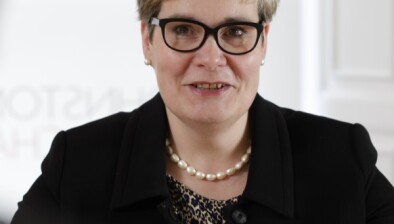Budget: Scotland raises taxes on high earners with new band at 45% introduced

Shona Robison
Finance Secretary Shona Robison has announced a series of fiscal, including significant changes to Scotland’s income tax structure, in yesterday’s Scottish Budget.
A new 45% tax band will apply to earnings between £75,000 and £125,140, marking a shift towards higher taxation for wealthier individuals. This move is accompanied by an increase in the top tax rate from 47% to 48% for those earning over £125,140.
The changes aim to address a £1.5bn shortfall in the Scottish budget. The government expects to raise an additional £80 million from the tax hikes on higher earners. This strategy brings the total number of income tax bands in Scotland to six, compared to three in the rest of the UK, thus widening the tax disparity between Scotland and other regions.
The decision to freeze the current threshold for the higher tax band at £43,663 means an additional 62,000 people will be subject to a higher tax rate of 42% or more. The Scottish Fiscal Commission estimates that these tax changes could generate £1.5 billion in revenue next year alone.

Alexandra Docherty
Highlighting the broader implications of these tax alterations, Alexandra Docherty, partner and head of Private Client Tax at Johnston Carmichael, expressed concerns over their complexity and potential economic impacts.
She said: “It’s no longer a simple affair to understand how much tax you pay in Scotland on your income and as Scottish taxes continue to diverge from the rest of the UK tax rates and tax bands, there could be a wider economic impact for Scotland in trying to attract talent North of the border.
“I believe this could particularly impact the financial services sector in Edinburgh, and across Scotland, and these tax changes could see them struggle to compete with the other key financial hubs in London, Bristol and Manchester.
“It was no coincidence that when the UK Chancellor Jeremy Hunt announced his reforms to deliver the ‘benefits of Brexit’ for the UK financial services sector in December last year that he did so in Scotland’s Capital and called it the Edinburgh Reforms. It had already been noted last year that there was a more marked decline in financial services jobs in Scotland than in the rest of the UK. The further increase to tax rates is unlikely to help to attract that talent to the Capital.”
Ms Docherty also pointed out the increased tax burden on those earning between £100,000 and £125,140, who will face a 67.5% effective tax rate by April 2024.
She continued: “Even without this tax rate increase, some have argued that what the Scottish taxpayer needs instead is a tax reduction. In fact, individuals earning over £28,000 already pay more tax than their UK counterparts.
“Someone earning £50,000 in Scotland will pay £1,542 more next tax year than their UK counterpart. The tax differential increases as income rises, with someone earning £150,000 in Scotland set to be £5,600 worse off in 2024/25 now this latest tax rate increase has come into play.”
Ms Docherty pointed out: “With over 39% of Scotland’s adult population not currently paying any income tax – based on figures published by the Scottish Government in December 2022 – it had been suggested that the focus should potentially have been redirected into ways in which the country can increase the taxpaying workforce, as that in turn would generate more tax revenues, as well as reduce the Scottish Budget deficit.”







